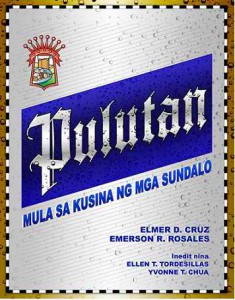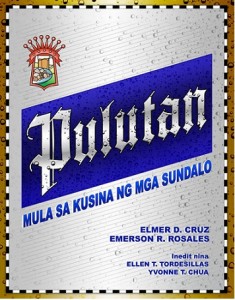Inspired by the success of their “Pulutan — from the soldiers kitchen,” Magdalo officers Elmer Cruz and Emerson Rosales have come out with a Tagalog version of their cookbook that was in the bestsellers list of the National Book Store for six months when it was first published in August 2007.
Cruz said they thought of coming out with the Tagalog version because of requests from those in the provinces and Overseas Filipino Workers.
He said: “We were told by many OFWs that they used recipes in our cookbook whenever they would get together and cook Filipino food abroad. They said they preferred it to be in Tagalog.”
The Tagalog version, “Pulutan — mula sa kusina ng mga sundalo,” contains additional recipes using tuna’s male organ and eggs. Another new recipe is “Inihaw na Red Scallops” (Broiled Red Scallops).
The original English version, which contained 100 recipes, was written while they were in detention at Fort San Felipe in Cavite City. It was edited by VERA Files trustees Yvonne Chua and Ellen Tordesillas. It is published by Anvil Publishing.
Cruz and Rosales, graduates of the Philippine Military Academy (Class 2000), were among those involved in the 2003 Oakwood mutiny.
On July 27, 2003 some 300 junior military officers and soldiers took over the Oakwood Hotel at the Makati Commercial Center and declared their withdrawal of support from the government of Gloria Macapagal Arroyo. No blood was shed in the 19-hour siege.
Cruz and Rosales were among those released in December 2007. They are now working as civilian personnel in government agencies. Rosales is also a co-owner of “Level Up,” a restaurant in Davao city.
They said the recipes were contributions from fellow Magdalo officers as well as their guards. They are re-creations of the flavors they have savored during their childhood, their cadet years and their stints at sea. Almost all parts of the country are represented in the book as the authors and contributors have gone around the Philippines in the course of their military duty.
Since they were detained in separate places, the authors gathered the recipes during court martial hearings. They said they tested all their recipes in the detention center kitchen.
They got the idea of coming out with a cookbook over an array of pulutan while they were celebrating Christmas in prison in 2005. Pulutan is a standard fare when soldiers get together.
As Navy officers, they are familiar with food preparation. Philippine Navy training requires them to be jack-of-all-trades. The first assignment for a Navy officer is in the mess hall.
“Pulutan is very Filipino,” the two said, adding that there is no English word that truly captures the concept of pulutan. Although some translate it as appetizer, the authors said it’s not accurate because pulutan is a meal by itself.
“In fact, when the plate stops being replenished, that means it’s time to go home: ‘Wala nang pulutan, uwian na’,” they wrote in the book’s introduction.
Cruz and Rosales said pulutan complements the admonition of health conscious folks never to drink on an empty stomach.
“That probably sets the Filipino drinker apart from other alcohol guzzlers of the world,” the two said.
The book has a section on exotic recipes that are specialties in rural areas like “Adobong dagang bukid” (field mice stew) and “Insectxotic” (sautéed field cricket).
Every section of the cookbook is introduced by anecdotes of their life in detention. The authors’ wit showed in the titles of some of the recipes like “French Kiss,” a beef tongue dish; and “Kiss my Chicken’s Ass” with chicken butts as main ingredient.
In one section of the book, Rosales related how he got the recipe of Paes or Steamed Stingray, a specialty in Cavite. He recalled the time when he was assigned in the Spratlys islands and he caught a stingray.
He ordered their ship steward to fry it. His instruction puzzled the steward but the latter did it as told. The fried stingray tasted awful, he said.
One night while in detention, he shared his experience with the stingray with one of their guards, who shared with him his recipe of steamed stingray.
“It’s indeed delectable,” Rosales said.
The most popular among the recipes is the contribution of Sen. Antonio Trillanes IV, which they named “Calamares a la Trillanes.”
Cruz and Rosales said while in prison, they never lost hope of being free again. That was what sustained them during their four years of detention.
Rosales wrote that in one of the hearings, he had a chat with Trillanes.
“We made a pact to go on ‘gimik’ or food trips when we are released,” he related.
He asked Trillanes if he had any particular place in mind and the senator replied: “Anywhere as long as there is seafood.”
Last week, President Aquino signed Proclamation 50 granting amnesty to all military personnel who rebelled against the Arroyo government. Trillanes, the only one left in detention, is expected to be released once Congress concurs with the amnesty proclamation.
Cruz and Rosales are now scouting for a good seafood restaurant.

